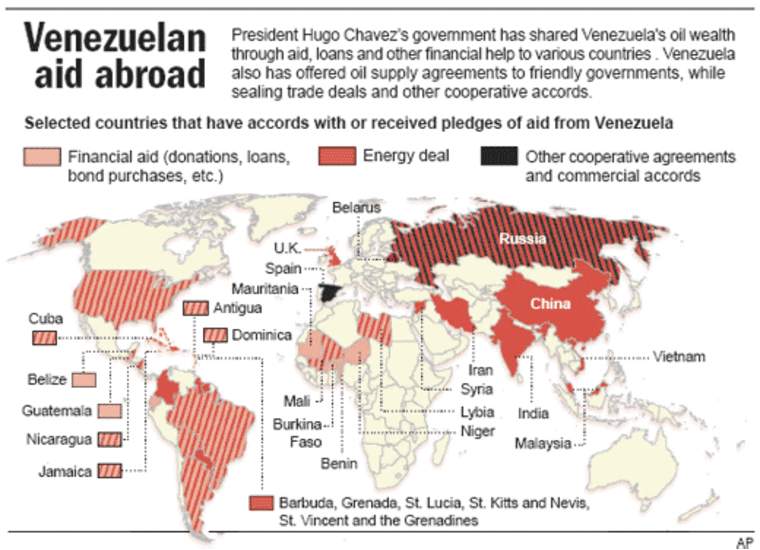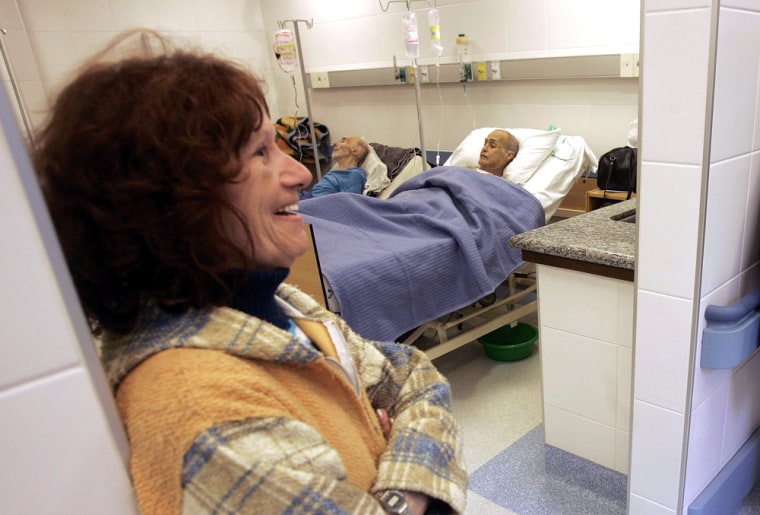As Venezuela lobbies for a U.N. Security Council seat, President Hugo Chavez has bolstered its chances by spreading petrodollars across the Americas and beyond — extending an airstrip on a Caribbean island, sending emergency food aid to Africa, fixing a rundown hospital in Uruguay.
Chavez’s international support will be put to the test on Monday as Venezuela goes up against U.S.-backed Guatemala in a General Assembly vote. At the same time, Chavez is confronting accusations at home that his generosity has been excessive, and has argued it’s a modest amount of aid for nations he sees as suffering from U.S. domination.
At Uruguay’s Hospital de Clinicas, a state-of-the-art transplant unit is being built with Venezuelan money. The emergency ward’s leaky roof and exposed cinderblocks have given way to freshly painted walls, windows in rust-corroded frames are being replaced, and new elevators are on order.
Hospital director Graciela Ubach put a hand over her heart to show her gratitude to Chavez.
“I thank him with my soul,” she said. “Honestly, it’s been a dream for the country.”
The public hospital struggled for funding for years until Venezuela came through with $20 million — half in donations and the other half to be paid off in reciprocal training and other services.
Other Chavez pledges include: $260 million in financing to repave a Jamaican highway and $17 million in upgrades to airports on the Caribbean islands of Antigua and Dominica.
Chavez also came up with $5 million for an Uruguayan tire plant, glass business and leather factory as part of a $400 million flow of aid since March 2005, when Uruguay’s leftist President Tabare Vazquez took office, according to the Venezuelan Embassy in Uruguay.
According to the U.S. State Department, which tracks the bulk of foreign aid, $3.3 billion was allocated in financial and development aid to Latin America and the Caribbean for all of 2005 and 2006, including military and anti-narcotics programs. Other estimates, which include aid not tallied by the State Department, put that figure closer to $4 billion.
A consolidated figure for Venezuelan aid is harder to come by, but a review of public pledges by its government suggest Venezuela, with an economy one-ninetieth the size of America’s, has offered at least $1.1 billion since the beginning of 2005 in loans, donations and financial aid in the region.
U.S. aid to Jamaica for 2005-2006 is listed as $42 million; the Chavez-financed highway job is six times costlier. The Venezuelan figure of $400 million for Uruguay compares with U.S. aid of $49,000 through the State Department plus an estimated $800,000 in military education and counter-drug assistance. No U.S. money was specifically set aside for Dominica.
In the case of Bolivia, the State Department estimates about $117 million in aid for 2006 compared with $140 million in Venezuelan donations and loans for scholarships and other programs.
Some of the aid involves relatively small sums aimed at highly symbolic targets, such as the tire-making cooperative in Montevideo that was abandoned three years ago by a U.S. company which ran into economic troubles. The factory was restarted with money from Chavez.
“The Venezuela government has given us a big hand,” said worker Wilson Tolotti, 57. “We will always be grateful.”

Venezuelan bulldozers have already begun clearing land at Dominica’s Melville Hall Airport for a longer runway to boost tourism. Under Petrocaribe, a deal bringing Venezuelan oil to needy Caribbean countries, the island has received asphalt, fuel storage tanks, university scholarships and $12 million for housing.
Dominica has supported Venezuela’s U.N. bid despite lobbying by Guatemala, and its foreign minister, Charles Savarin, has acknowledged that Venezuela’s aid “cannot go unnoticed” as a factor in the decision.
Both Venezuela and Guatemala say they have a majority in the 192-member General Assembly ahead of Monday’s poll, but either would need two-thirds to win. If after repeated ballots neither side is able to muster that many votes, the 33-nation Latin American group might decide to put up another candidate.
It’s a secret ballot, and countries aren’t obliged to make known their preference, though much of the Caribbean and South America — including Uruguay — have voiced support for Venezuela.
U.S. officials, however, have spoken out against Venezuela and lobbied for Guatemala, which has the support of Colombia, apparently most of Central America, Europe and other countries.
The 53 countries in the African group are expected to tilt toward Venezuela, while Asia’s 54 nations are said to be split.
Ten of the Security Council’s 15 seats are filled by the regional groups for two-year stretches. The other five are occupied by its veto-wielding permanent members: Britain, China, France, Russia and the United States.
Chavez’s aid pledges, meanwhile, have come under attack ahead of Venezuela’s Dec. 3 presidential vote by opposition candidate Manuel Rosales, who says poor Venezuelans need the money.
Chavez points to government-funded improvements at Venezuela’s universities, medical clinics, subsidized food markets and train lines, and insists his foreign aid is aimed at countering the effects of U.S.-inspired capitalism.
Ironically, this aid is bankrolled in large part by oil sales to the United States.
Venezuela also bought or pledged to buy more than $3.6 billion in bonds from Argentina, Ecuador and Bolivia to help them cover deficits. Most of that — $3.5 billion — went to Argentina, helping a leftist ally pay off its World Bank and International Monetary Fund debts. Venezuela then recycles the bonds though its own banks and ends up with a profit that between early last year and July 2006 totaled $200 million.
It’s difficult to quantify the value of Chavez’s many oil supply agreements under preferential terms to at least 17 countries across the region, including Cuba. Venezuela says it sells the fuel at market prices but offers low-cost financing and accepts partial payment in goods from cows to bananas.
The state oil company even offered an unspecified sum this year to a Brazilian samba group that won first prize in the Rio de Janeiro carnival parade. “It made us very happy and feeling like we are part of the triumph,” Chavez said later.
The U.S. is the world’s largest overall aid donor, though far less generous than Japan and European countries, given the size of its economy. Venezuela’s largesse, meanwhile, goes far beyond the Western Hemisphere.
Last year it gave a total of $3 million in emergency food aid to Burkina Faso, Mauritania and Niger. It pledged to sell oil under preferential terms for London’s trademark red buses in return for the leftist-run city’s expertise in transport, housing and other areas. It is expanding its program in the United States to provide discounted heating oil to the poor.
Chavez says he’s helping to build a “multipolar” world to counter U.S. dominance, lining up allies against what he calls a perpetual threat from Washington. A U.N. Security Council seat would give this ambition a sharp boost.
